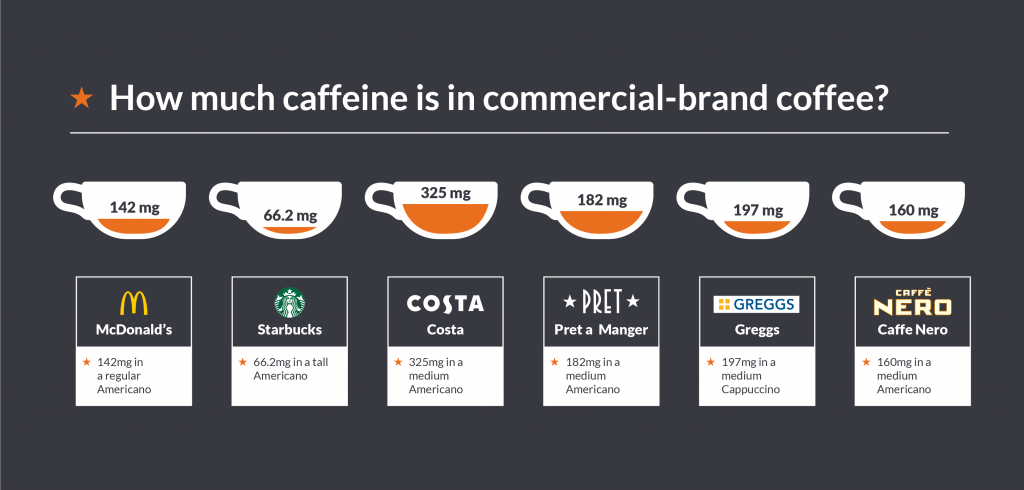Higher Caffeine Content Found in Chain Coffees
353
- Home brewed coffee contains between 80-100 mg of caffeine per 240ml cup while commercial coffee can contain up to 325 mg in a medium cup.
- Costa coffee contains five times as much caffeine as Starbucks coffee and three times as much as homemade coffee.
New analysis conducted by Expert Reviews has discovered significantly higher caffeine levels in chain coffee shops, compared to home brewed coffee.
Caffeine data from coffee chains such as Starbucks, McDonald’s and Pret a Manger show their standard brewed coffees range from 66-325 mg caffeine in a medium/regular size. This range is notably higher than a typical 240 ml cup of home-brewed coffee, which averages 80-100 mg of caffeine.
| Beverages | Caffeine content |
| Brewed coffee (240ml cup) | 80-100 mg |
| Espresso (shot) | ~65 mg |
| Cold brew (240 ml) | ~100 mg |
| Instant coffee (240ml cup) | 60-80 mg |
| Decaffeinated coffee (240ml cup) | ~2 mg |
| Costa (medium Americano) | 325 mg |
| Greggs (medium Cappucino) | 197 mg |
| Pret a Manger (medium Americano) | 182 mg |
| Caffé Nero (regular Americano) | 160 mg |
| McDonald’s (regular Americano) | 142 mg |
| Starbucks (tall Americano) | 66.2 mg |
The chain coffee shop that serves the Americano with the highest caffeine content is Costa, with a staggering 325 mg – a whopping 165% more than the coffee from Greggs.
A medium Cappucino from Greggs contains 197 mg of caffeine, making it the chain that sells the second most caffeinated coffee. Pret a Manger has less of a caffeine kick and stands in third place with 182 mg for a regular Americano.
Health experts recommend limiting caffeine to 400 mg per day for most adults – 200mg for pregnant individuals. This means that if you’re buying more than 2 cups of commercial coffee per day, you will likely be exceeding the recommended caffeine limit. For reference the daily coffee consumption in the UK has reached 98 million cups.
The increased caffeine levels found in chain coffee shops are likely due to the specific roasting and brewing processes used by the big coffee companies. Darker roasts, finer grinds, and longer brew times can all extract more of the natural caffeine from the coffee beans.

For most people, a few cups of home-brewed coffee isn’t a major health concern. But if you’re drinking multiple cafe coffees daily, the caffeine can start adding up quickly. Excessive caffeine consumption can cause side effects like insomnia, anxiety, rapid heartbeat and more.
While coffee can be part of a healthy diet, it pays to watch your caffeine intake, especially from handcrafted coffeehouse and restaurant brews. Making coffee at home gives you more control over just how much of a caffeine kick you’re getting.




